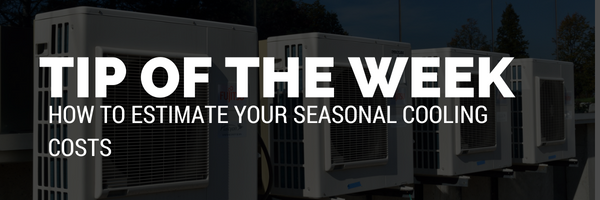Summer is here and energy bills are spiking everywhere. This is a bummer for many homeowners after a nice month or so of low energy costs, thanks to spring’s mild temperatures. You’ve probably wondered how much does it cost to run an AC, which is helpful to know so you can estimate your summertime utility costs and stick to your budget.
While, there is no right answer for how much it cost to run an AC unit, as all homes are different and several variables will affect the cost Tower has created this guide that can help you create an estimate. Continue reading to learn what those variables are, how they affect your cooling costs, as well as averages so you can estimate your seasonal cooling costs.
Variables that affect cost
There are six main factors that will affect how much it costs to run an A/C unit. All households are different so it is important to look at these factors to find out what fits your household before making calculations. Here are the variable and how they impact your operating costs:
- Energy Costs: The amount you pay per unit of energy consumed will affect how much your total A/C costs are. Electric utility providers typically charge by the kilowatt/hour. In the U.S., the average cost per kWh is 12 cents. You can find out exactly how much you are charged per kWh by checking your last utility statement for the cost or contacting your utility provider or you can click here for the average kHw costs by state.
- A/C energy efficiency: The SEER rating of your air conditioner will also affect how much it costs to run the A/C. Units with higher SEER ratings are more energy efficient, meaning they produce more cooling per unit of energy consumed. With proper installation, a unit with a higher SEER will cost less to cool a home versus a unit with a lower SEER rating under the same conditions.
- Thermostat settings: How you program or set your thermostat will greatly affect how much it costs to run the A/C. Keeping the temperatures lower for the longer will cost you more, while setting them higher for longer periods of time will keep costs down. Click here to learn more about how to set your thermostat to run more efficiently.
- Outdoor Conditions: In the summertime, outdoor weather and temperatures can vary greatly. During periods of extreme heat and high humidity, your air conditioner works harder to keep your home cool. These conditions will affect how much it costs to run the A/C, and you will likely notice higher utility bills when temperatures are very hot.
- A/C Installation, Maintenance & Ducts: If your A/C system was not installed properly, your unit will not deliver the efficiency level you expect. Also, if you do not have your cooling system professionally maintained each season or fail to change the furnace filter regularly, your system will consume more energy to provide cooling. Duct leaks in your duct system can result in up to 30 percent energy loss, forcing your air conditioner to work more to cool your home and driving up utility costs.
- Size of the home: Larger homes cost more to cool than smaller homes as there is more space to cool. Limiting rooms to be cooled with zoning systems can reduce the cooling load and keep energy costs lower.
Formula for determining A/C costs to operate:
To determine how much energy your air conditioner consumes and how much does it cost to run your AC, you can estimate it using energy regarding your unit and plugging it into the formula below:
- First, determine the amps drawn by the unit. This will depend on the unit’s size and SEER rating. For example, we will use a 16 SEER air conditioner. A 2-ton AC at this SEER rating is approximately 15 amps; 3-tons is 18 amps; 4-tons is 21 amps.
- Next, calculate the wattage consumed. A typical whole-home air conditioner uses a 240-volt power outlet. Multiply the amps by 240 watts, which equals 4,320 watts.
- To find the kWh, divide by 1,000. 4,320 watts / 1,000 = 4.32 kWh.
Use your kWh unit cost to find out how much does it cost to run the AC for an hour. The formula is kWh x kWh unit cost = cost to operate an AC for an hour.
With finding the answer to how much your AC runs for an hour you can then go on to find out how much it costs to run your A/C all day or all night:
- To find out how much it costs to run A/C all day, use the cost you found for the one-hour period, and multiply it by the amount of hours your A/C runs during the day. This number varies between households, as many families set back their thermostats while gone for the day, while other homes may be occupied throughout the day. This total will vary greatly depending on the temperature you keep your home at and for how long, as well as the outdoor temperature. This general total will give you a rough idea of how much it will cost to run the system throughout the day.
- To find out how much it costs to run your A/C all night, determine how many hours your air conditioner will run over night. Use the cost per one hour you found earlier and multiply it by the amount of hours your A/C runs at night.
Did you know programmable thermostats can help you saving money this summer on your energy bills? Check out this article to see how it can benefit you or contact or professionals today at:
1320 West Broad Street 92 Weston Street, Unit 31
Stratford, CT 06615 Hartford, CT 06120
(203) 375-4420 (860) 724-3138
Fax: (203) 378-7635 Fax: (860) 724-0821
Or email us at orders@towereq.com

0 Comments Leave a comment